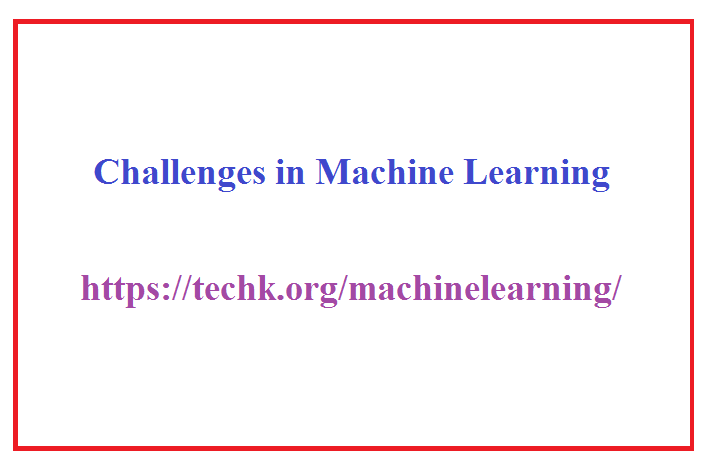Challenges In Machine Learning - Machine Learning Topic
Category: MACHINELEARNING | 15th July 2025, Tuesday

ML Research And Application Face numerous Challenges Across Data Quality, Algorithmic Complexity, Generalization, Interpretability, Ethics, And Deployment. Below Are The Key Categories:
1. Data-Related Challenges
a. Data Quality And Quantity
-
Noisy Data: Real-world Data Is Often Corrupted, Mislabeled, Or Contains Outliers.
-
Incomplete Or Missing Data: Many Datasets Have Missing Values Which Bias Learning If Not Handled Properly.
-
Class Imbalance: For Tasks Like Fraud Detection, The Minority Class Is Often Underrepresented, Leading To Biased Models.
Example: In Medical Diagnostics, Disease Cases (positive Class) Are Far Fewer Than Healthy Ones, Resulting In High False Negatives.
b. Data Annotation
-
Manual Labeling Is Expensive: Labeling Large Datasets (e.g., Medical Images) Requires Domain Experts.
-
Label Noise: Human Annotators Can Make Mistakes, Introducing Label Noise That Misguides Models.
PhD-level Challenge: Designing Robust Learning Algorithms That Can Tolerate Label Noise.
c. Data Privacy And Security
-
Access To Sensitive Data (e.g., Health Or Financial Records) Is Restricted Due To Privacy Laws (GDPR, HIPAA).
-
Federated Learning And Differential Privacy Are Emerging Solutions, But Introduce Complexity.
2. Algorithmic And Theoretical Challenges
a. Generalization And Overfitting
-
ML Models, Especially Deep Learning, Can Easily Memorize Training Data.
-
Ensuring That A Model Generalizes Well To Unseen Data Is A Core Issue.
Research Focus: Regularization, Dropout, Cross-validation, And Bayesian Inference.
b. Interpretability And Explainability
-
Complex Models Like Deep Neural Networks Are Often black Boxes.
-
Interpretability Is Essential In High-stakes Areas Like Healthcare, Law, Or Finance.
PhD-level Topic: Development Of explainable AI (XAI) Methods (e.g., SHAP, LIME, Counterfactual Explanations).
c. Adversarial Robustness
-
ML Models Are Vulnerable To Small, Carefully Crafted Perturbations (adversarial Examples).
-
Securing Models Against Such Attacks Is An Open Challenge.
Example: Slight Pixel Changes In An Image Fooling A Self-driving Car’s Vision Model.
3. Computational And Resource Challenges
a. High Computational Cost
-
Training Deep Networks Requires massive Compute Resources (GPUs/TPUs).
-
Cost And Energy Efficiency Are Major Bottlenecks For Both Academia And Industry.
Research Direction: Model Compression, Pruning, Quantization, Knowledge Distillation.
b. Scalability
-
Many ML Algorithms Scale Poorly With Large Datasets (e.g., Gaussian Processes Have O(n³) Complexity).
-
Need For Distributed Training, Online Learning, Or More Efficient Approximations.
Challenge: Designing Scalable Algorithms That Can Process Billions Of Samples In Real Time.
4. Model Evaluation And Benchmarking
a. Poor Evaluation Metrics
-
Accuracy Is Misleading In Imbalanced Datasets.
-
Selecting Appropriate Metrics (F1, ROC-AUC, Precision-recall) Is Crucial.
Master-level Topic: Multi-objective Evaluation And Trade-offs In Model Selection.
b. Lack Of Real-World Testing
-
Many Academic Benchmarks Do Not Reflect Real-world Challenges (e.g., Noise, Non-stationarity, Heterogeneity).
-
Sim-to-real Gap Is Prominent In Robotics And Autonomous Systems.
5. Ethical And Societal Challenges
a. Bias And Fairness
-
Models May Learn And Amplify Societal Biases Present In Training Data.
-
Ensuring fairness Across Gender, Race, And Economic Status Is Both A Technical And Moral Challenge.
Example: Facial Recognition Systems Performing Poorly On Darker Skin Tones.
b. Autonomy And Accountability
-
Who Is Responsible When An ML-driven System Fails (e.g., Autonomous Car Crash)?
-
Regulations And Ethical Frameworks Are Lagging Behind Rapid ML Adoption
c. Misinformation And Misuse
-
Deepfakes, AI-generated Text/images Can Be Used For Misinformation, Fraud, And Manipulation.
-
Requires Detection Frameworks, Watermarking, And Regulatory Guidelines.
6. Transferability And Generalization
a. Domain Adaptation And Transfer Learning
-
ML Models Often Fail When Applied To Data From Different But Related Domains (domain Shift).
-
Transfer Learning And Unsupervised Domain Adaptation Remain Active Areas Of Research.
PhD-level Work: Adapting A Model Trained On Synthetic Data To Work On Real-world Data.
b. Catastrophic Forgetting
-
In Continual Or Lifelong Learning, ML Models Forget Previously Learned Tasks When Trained On New Data.
-
Solutions Involve Elastic Weight Consolidation, Replay Buffers, Or meta-learning.
7. Autonomous Decision Making & Reinforcement Learning
-
Sample Inefficiency: RL Agents Often Require Millions Of Interactions To Learn Policies.
-
Reward Specification Problem: Mis-specified Rewards Can Lead To Undesirable Behavior.
-
Safe Exploration: How To Explore Without Risking Harmful Actions In Real-world Environments.
Summary Table
| Challenge Area | Example Problem | Research Direction |
| Data Quality & Imbalance | Biased Medical Diagnosis | Data Augmentation, Synthetic Data |
| Interpretability | Why Did The Model Reject A Loan? | SHAP, LIME, Causal Models |
| Adversarial Attacks | Image Perturbation Fools Classifier | Robust Optimization, Adversarial Training |
| Scalability | GP For 1M+ Samples Is Too Slow | Sparse Approximations, Distributed Learning |
| Bias & Fairness | Hiring Models Prefer Male Applicants | FairML, Ethical Auditing Frameworks |
| Transfer Learning | Model Fails On New Hospital Data | Domain Adaptation, Invariant Representation |
Final Thoughts For Master’s & PhD Students
-
Master's Students Should Focus On understanding And Evaluating These Challenges In Applied Settings.
-
PhD Students Are Expected To advance The Field By Developing novel Algorithms Or theoretical Frameworks That Address One Or More Of These Issues.
-
Collaboration Across Disciplines (statistics, Cognitive Science, Ethics, Law) Is Essential In Building Trustworthy AI Systems.
Machine Learning (ML) Faces Key Challenges Across Data, Algorithms, And Deployment. Poor Data Quality, Imbalance, And Privacy Concerns Hinder Model Training. Overfitting, Lack Of Generalization, And High Computational Demands Limit Performance. Interpretability Remains Critical In High-stakes Applications, While Models Are Vulnerable To Adversarial Attacks.
Ethical Issues Like Bias, Fairness, And Misuse Of ML Systems Raise Societal Concerns. Scalability And Transferability Across Domains, Especially In Real-world Settings, Remain Unsolved. Addressing These Challenges Requires Advances In Theory, Robust Algorithms, Explainable AI, And Interdisciplinary Collaboration To Ensure Safe, Fair, And Efficient ML Deployment In Critical Domains Like Healthcare, Finance, And Cybersecurity.
Tags:
Challenges In Machine Learning, Machine Learning Topics
